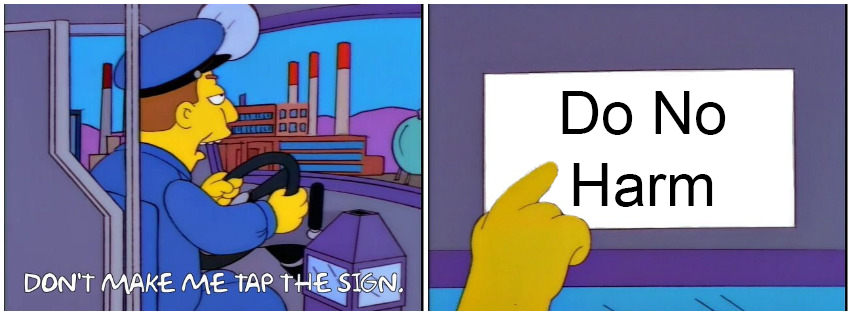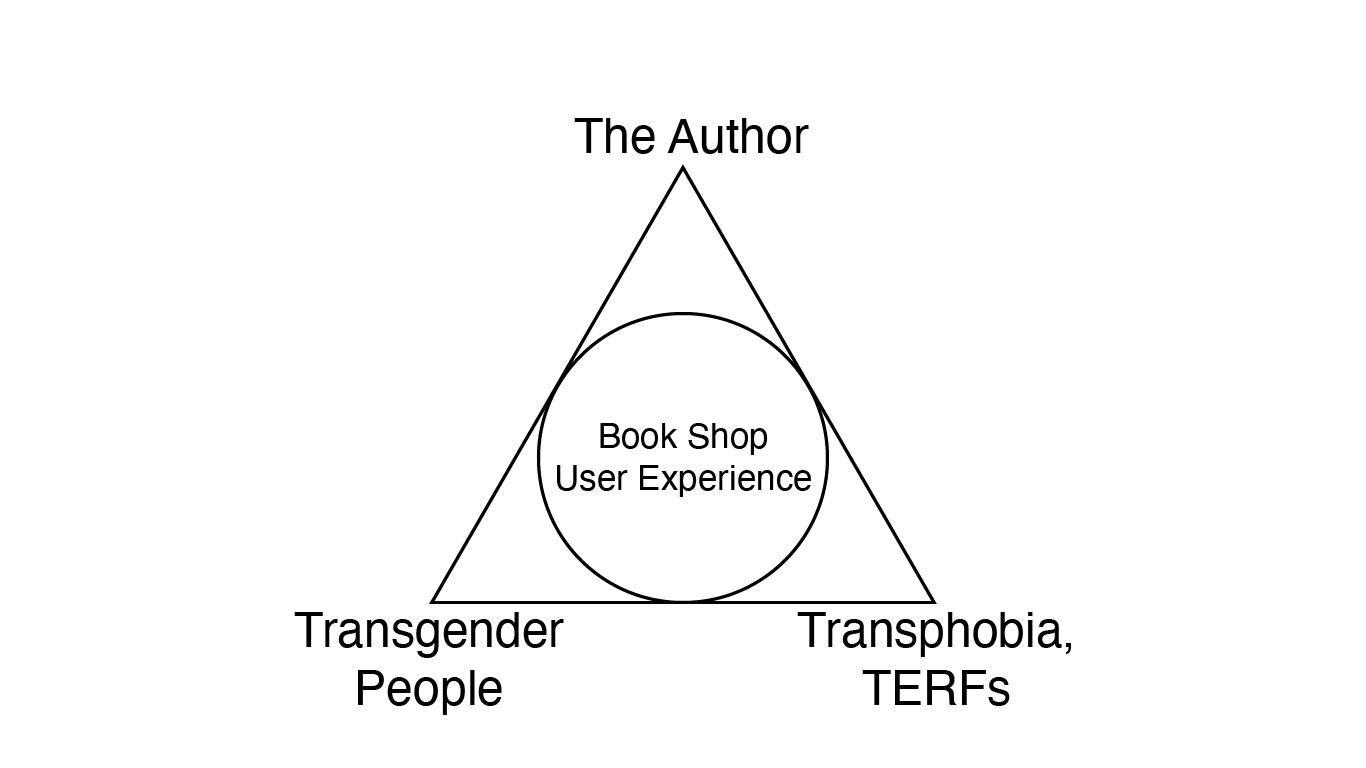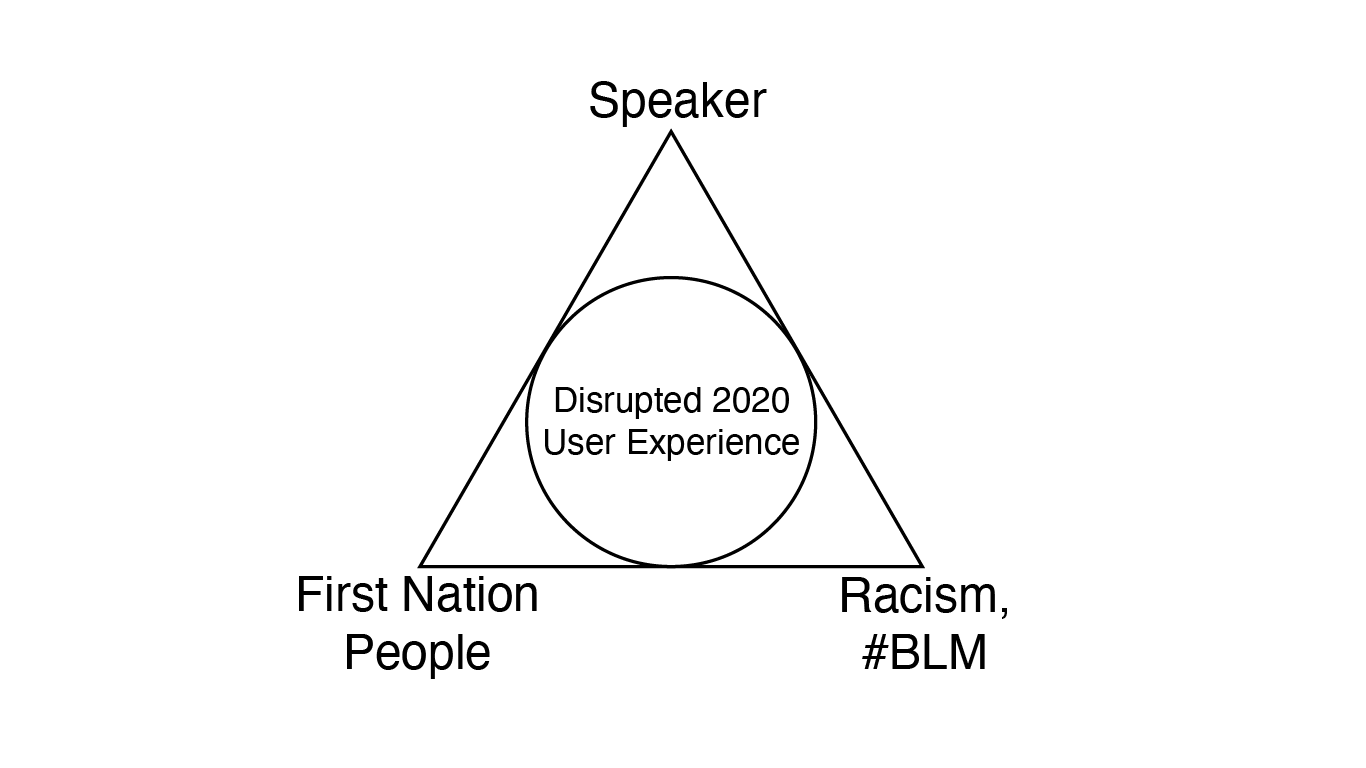Ever since I wrote my 'Do No Harm' post late last year, I've seen a few examples of where this model could be used in GLAMs around the word. I'm not the best at self promotion but occasionally I will see twitter conversations around this topic and drop a link to the model. This is usually met with positive comments but is quickly forgotten. I've been encouraged to write it up properly for something like Lead Pipe so it can get a wider exposure, but that will be a bit of a work in progress at the moment. There were two events that prompted me to write this particular post, both could have had the model of Do No Harm applied quite easily.

Background
One of the events did in fact use a version of this model where as the other did not. Interestingly (but not surprisingly), where it was used was a privately owned book store, while the other example was a rather large library.
The two events that motivated me to write this piece were:
- Rabble Books and Games no longer giving shelf space to JKR (full FB announcement here)
- The State Library of WA inviting Jacinta Price to Disrupted 2020
There is a lot to unpack so bear with me here.
Rabble and the T.E.R.F.
A quick summary of the Rabble Books and Games (a Perth, WA, based book store) decision is that due to her ongoing and continual transphobic comments, beliefs, and actions, Rabble will no longer give valuable shelf space to JKR books. What does this mean? Simply that they won't keep her books in stock. You can still order them in (and they'll donate the profits to local trans organisation TransFolk of WA). In their stead, Rabble are actively sourcing queer and trans positive fantasy books to give them the valuable shelf space.
There have been cries of 'censorship', and the Rabble team have had to suffer a lot of abuse (but also a lot of love too!) over this decision. However their decision is clearly rooted in the values of 'harm minimisation' for their community.
"Whilst stocking a book isn’t an endorsement (good grief, that would be a minefield), and we will always take orders for books that aren’t in stock, there are more worthy books to put on the shelf, books that don’t harm communities and won’t make us sad to unpack them." - Rabble Books and Games
To make my position on this absolutely plain, I personally think they did a very good thing and I have donated to TransFolk of WA directly because of this. That said, I would like to break down how this decision is reflective of my harm minimisation approach to GLAM.
Sidebar
Because I hate self promotion, when I originally pitched this model I named it 'The 'Hallows' Interaction Model', because I like puns and it was literary. I have since renamed it 'The Shaddow Interaction Model', but wear that it was originally named after one of JKR's creations. My bad.
The model in action
Rabble are actually a good example of the harm minimisation approach in action, not just in this case. There are three main harm minimisation strategies that we can look at:
- Harm Reduction - Reduce the harm from library/information use for both the individual and community.
- Supply Reduction - Reducing the supply of harmful information.
- Demand Reduction - Preventing the uptake of harmful information.
Harm Reduction
Rabble constantly run queer and trans friendly events including Drag Queen Storytime, and author talks. To be honest, this latest move by the Rabble team is not out of character at all. Their stock is also very diverse and often highlights queer, gender-diverse, and First Nation authors above others.
Supply Reduction
By no longer stocking JKR's books, the supply has been reduced. Although the books can still be ordered in, this would make obtaining them a conscious decision rather than a spontaneous purchase.
Demand Reduction
What was probably meant as a 'this is all we can do' effort to reduce the influence of JKR and protect their community, Rabble have gained international attention and started conversations. I've been in the store when Nat has started some great conversations around diverse authors, educating the public around First Nation voices, and having some difficult conversations with customers. The addition of seeking queer and trans friendly alternative stock also allows for queries to turn into readers advisory and promote other voices.

Rabble are not just looking at JKR books in isolation. They have considered the individual (trans people, and allies), the environment (transphobia), and the author (continuous anti-trans statements, questionable characters), and how these interact together to give a user's experience of being in their bookshop. How these three things interact can make the difference between a good book buying experience, and a panic attack for a vulnerable person.
Could a public library do what Rabble has done?
It's all very well and good for an independently owned and operated book store in WA to make this kind of call, but could this work in a public library? To an extent, a lot of what Rabble have done could be replicated:
- No JKR displays (or any of her pseudonyms)
- No HP themed events (do we even still need these?)
- Promoting trans, queer, and diverse authors instead
- Actively invite trans speakers/authors for events
For an added bonus you could raise money for local trans organisations from staff and patrons.
Is it censorship though?
I'm on the side that declining to stock these books is not censorship. You can still order them in, you can still read her opinions on Twitter (if you hate yourself that is). By choosing not to highlight her books in displays and run events based on her work, you are not censoring. There are thousands of other authors who don't get displays made about them. Choosing instead to raise up voices of those who struggle to be heard helps the community, while raising up voices of hatred can actively harm it.
Will libraries stop stocking those books?
Probably not, to be honest.
Should they?
Hard to say. I personally feel that those materials could be in the collection, just not actively promoted/displayed/invited to talk. While loans can (possibly) give profit to the author, via the Public Lending Right (PLR), it's a way to consume those items without purchasing a full copy (you can always donate to a charity to off-set the PLR money!).
Now we've seen how the harm minimisation model can be used effectively, lets look at an example where it's not even considered.
Disrupted 2020
The State Library of WA's (SLWA) Disrupted Festival of Ideas runs annually in Perth, WA. Usually a fairly standard affair, sometimes an attendee will throw some yoghurt at Leigh Sales.
Disrupted Festival of Ideas is day of insightful conversations, panel discussions, keynotes and activities taking over the State Library of Western Australia. - Disrupted FB
This year, the State Library decided to actively seek out and invite Jacinta Price to speak at the festival. Price's values and attitudes are well known, and appeal to a particular section of the more right leaning population. It seems that Price was invited despite warnings from the Noongar community that this was a bad idea.
"Disrupted Festival was about debate and exchange of ideas, not about everyone agreeing." - Margaret Allen, State Librarian
"The State Library does not believe in censorship or that Ms Price has crossed a line, which means her views should not be aired or given a platform... We acknowledge that the local Noongar community does not share this view." - Margaret Allen, State Librarian
I just...*rubs temples*
I haven't been able to find out why SLWA invited her to speak, either. What was the point of inviting someone like Price to Disrupted? From what I can tell (and this is my own view on the situation), it reads very much like a publicity stunt hiding behind a veil of 'debate and exchange of ideas'.
The model, inaction
If we apply the harm minimisation model we can see how particular actions actively cause harm to the community.
Harm Reduction
By inviting Price to speak, SLWA has angered and insulted First Nation people in WA. Quite possibly ignoring sound advice to not go ahead with it from the community and possibly their own staff (they admit to knowing this event would cause harm so I assume people had told them not to do it?).
Supply Reduction
They literally gave a platform to her views and wanted to raise her voice above others. Allen does mention in that article that they would invite the Noongar community to engage with Price, however I feel that this is purposely putting the community in harms way.
"We will also invite members of the local Noongar community to join Jacinta on a panel to discuss her ideas" - Margaret Allen, State Librarian
Demand Reduction
Despite their backflip over the decision, there has been a lot of press and attention given to this. While the opposite of the Rabble publicity, if you look at the comments for that article and FB posts (please don't), you can see there are a lot of racist comments. Almost as if SLWA announcing Price as a speaker was a dog-whistle of sorts?

The State Library failed to look at the situation as a whole. Ignoring the current climate of Bla(c)k Lives Matter, anger, and ongoing systemic racism, they chose to select a controversial speaker, rather than raise up the voices of those who need to be heard. Price was only dropped, it seems, because of the closed WA borders not because the State Library had a good hard look at themselves.
Lack of values
It's hard to imagine that an independent book store has more ethics and values than the State Library. Then again, libraries have been hiding behind the problematic value of 'neutrality' for far too long.
"The State Library believe [sic] libraries best serve their communities when they openly and freely support citizens in accessing and understanding information of different kinds, even when this information may include views that are considered controversial." - SLWA FB
While the word 'neutral' isn't mentioned in that post, or in the article about the event, I believe that this is the value that SLWA is looking to when considering speakers. I came across this excellent post on Twitter from @eminencefont that I think suits this situation well.
"Neutrality has become the rug under which we shove all the values our leaders claim to hold so dear." - @eminencefont
I honestly believe that 'neutrality' a) cannot be achieved in our current systems, and b) causes more harm than good to our communities. How can a library 'best serve' their community by causing pain and harm to it? Who do you expect to come to these events and 'access and understand' different points of view? What is the outcome that you are hoping for in this instance?
I personally feel that libraries have to change, and they have to change now. If a book store can not only stop harm in their community, but actively push care, kindness, and love, but at the same time a library causes pain, anguish, and harm; what kind of values do we actually care about?
Neutrality lets us pretend we're doing good. Actually doing good is much harder.